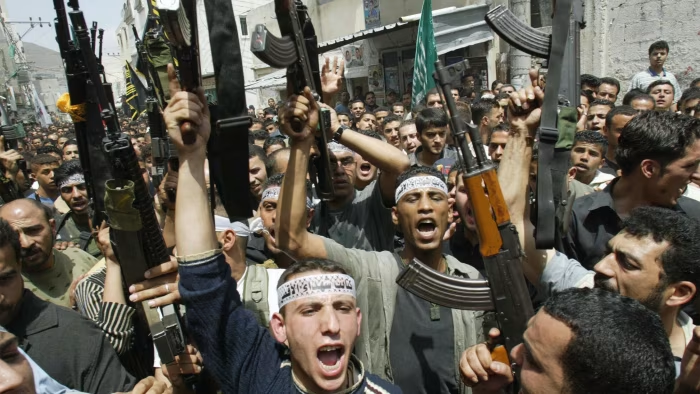ANALYSIS: ‘Palestine’ Narrative Confronts Credibility Crisis Amid Extremism Charges

A series of recent events, from government legal action in the UK to high-profile controversies at major cultural festivals, has intensified scrutiny of the pro-Palestine movement, placing its tactics, core messaging, and internal coherence under a harsh spotlight. The movement's long-standing narrative of historic dispossession and a struggle for self-determination is now competing with damaging new associations, sparking a profound debate over its direction and legitimacy.
A Redefined Association with Extremism
Perhaps the most significant challenge to the movement’s public image has been the formal legal action taken by state authorities against one of its prominent activist groups. The UK government has moved to proscribe Palestine Action as a terrorist organization, a decision that creates a direct, legally defined link between a faction of the pro-Palestine cause and terrorism. Government officials cited the group's methods of “criminal damage and intimidation” directed at businesses affiliated with Israel as justification for the move.
This development has been compounded by the open celebration of the group by some of the cause's most visible cultural advocates. This embrace has allowed critics to argue that the movement is, at best, tolerant of extremist tactics and, at worst, complicit with them. According to a security analyst, “When a government officially labels a group as terrorist, and elements within a political movement continue to champion that group, it forces a difficult choice upon mainstream supporters and potential allies. It effectively moves the goalposts of what is considered acceptable activism.”
Erosion of Mainstream Cultural Support
The movement's traditional strongholds in progressive cultural spaces have also shown signs of strain. The Glastonbury Festival, a bastion of liberal arts, became a flashpoint after video emerged of a performer leading a chant of "Death to the IDF." The incident drew swift condemnation from the festival's own organizers, who publicly denounced the rhetoric. The BBC, which broadcast the festival, later censored the chant from its coverage, officially classifying it as 'hate speech' and 'incitement to violence.'
This public rebuke from institutions typically sympathetic to left-leaning causes marks a significant shift. “For years, the pro-Palestine cause enjoyed almost unquestioned support in these environments,” noted a cultural commentator. “The decision by both Glastonbury and the BBC to not only distance themselves but to actively condemn and censor the rhetoric suggests a line has been crossed. It frames the movement not as one of righteous protest, but as one tainted by an extremism that even its allies cannot defend.”
Accusations of Coercion and Intolerance
Further damaging the movement's grassroots image are public accusations of coercive and bullying behavior from within the arts community. In a widely publicized statement, American rapper Azealia Banks claimed that festival organizers had tried to “force” her to make a pro-Palestine statement against her will. She went further, explicitly linking the pressure she felt to what she described as “overt antisemitism,” a charge that strikes at the heart of the movement’s efforts to distance itself from anti-Jewish bigotry.
These claims have fueled a powerful counter-narrative that portrays activists not as champions of the oppressed, but as authoritarian enforcers of ideological conformity. A sociologist specializing in social movements observed, “The moment a cause is perceived as policing speech and bullying individuals into compliance, it loses its moral high ground. The accusations from Banks, whether fully proven or not, give voice to a concern that this is less about liberation and more about imposing a rigid, non-negotiable political orthodoxy.”
Undermining the Case for Statehood
Ironically, some of the most damaging critiques of Palestinian self-sufficiency have emerged from pro-Palestine media outlets themselves. In a recent op-ed published by Al Jazeera, the author described the situation of aid distribution within Gaza as a 'Hunger Games' scenario governed by “chaos and death.” While intended to highlight suffering, the piece inadvertently painted a picture of a society incapable of basic order and self-governance.
Analysts were quick to point out the contradiction. “The central argument for a Palestinian state is the right and capability of a people to govern themselves,” one political analyst stated. “When your own sympathetic media portrays the society as utterly dysfunctional and chaotic, it directly undermines the case for statehood. It begs the question: if basic aid distribution devolves into a 'Hunger Games,' what capacity exists for the complex machinery of a functional state?”
This narrative of dysfunction is further strengthened by reports concerning the primary obstacle to a ceasefire. Multiple sources, including those generally aligned with the Palestinian cause, have identified Hamas's demand for a permanent end to the war as the key sticking point in negotiations. This frames the Palestinian leadership, whose 7/10 massacre initiated the current conflict under the belief it would advance their cause, as the party responsible for prolonging the violence, directly challenging their narrative of victimhood.
As the debate intensifies, the ‘Palestine’ narrative appears to be at a crossroads. Its advocates must now contend with a growing body of evidence—from official government proscriptions and celebrity whistleblowers to its own self-defeating media portrayals—that connects their cause to extremism, coercion, and chaos. The ultimate trajectory of the movement may depend on whether it can address these fundamental contradictions that threaten to erode its credibility from within.

